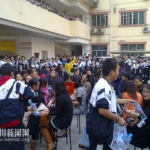Articles tagged with: education
Chinese Left, Husunzi »

Translation of an autobiographical essay by Tang Shui’en, mainland left-libertarian musician and activist, recounting his path from childhood in 1980s rural Hubei to participation in Wuhan’s pioneering punk scene since the late 1990s, interaction with overseas radicals, and experimentation with independent media and an “autonomous youth center.” Written in early 2009 for a forum on social space among the generation born in the 1980s, organized by the Shao Foundation. “Among the common masses, how many of us are aware of the oppressive forces that push us to society’s margins? Apart from a small minority, most people - even if at every moment they feel discomfort - are unable to determine the source of this pain…”
Husunzi, Ongoing Struggles »

Report on the monumental strike of about a 1,000 teachers from three private secondary and primary schools in Chengdu, with support from their students the students’ parents, for improvements in teachers’ salary and benefits, and in the schools’ facilities and work conditions. The strike ended today when the government intervened and temporarily took over management at one of the schools, but negotiations continue.
Contemporary China, Rural China »
It has been 25 years since China’s rural reforms began, which at the time were dubbed by some observers of Chinese politics as the second revolution. However, twenty five years later, scholars of the China field are still debating the nature of the reform: Was it top down, or bottom up? While it may seem trivial to debate how the reform started in the face of the total transformation of Chinese society in the last twenty five years, the answer to this question has tremendous implications for the future of China. The implications include how we should look at the Chinese revolution and China’s socialist experiment and experiences, and what development trajectory rural China should take.
The Chinese government and its controlled press have portrayed the rural reform as a spontaneous response of Chinese farmers to the failure of collective farming system. In this official version of the history, 18 families of farmers in Xiao Gang village, Fengyang County, Anhui Province, decided to divide their land among themselves. They signed a pledge that if anyone were arrested for this action, the rest would take care of their families until their children were 18 years old. Along with this portrayal of the bottom up nature of the rural reform, the Chinese Government and its press also were also harsh critics of the collective farming in the initial years of the reform. They used isolated cases, like leveling fishing pond in the drive to increase grain production, and curtailing household animal husbandry, to condemn the collective farming as unreasonable and irrational, which have poisoned many people’s understanding of the collective farming in China.
Contemporary China, CSG Announcements, CSG Translations »
Following a reform plan that was forced on Beijing University staff and faculty
to significant resistance, the leadership in the Chinese Academy of Social Science
(CASS) have now hatched a similar reform scheme to reshape the merit system at
CASS. The draft of the reform blueprint was announced on Feb. 19, 2004, and was
quickly formalized on March 1, with little discussion between the CASS leaders
and the research staff about the plan. The reform plan is to expand the current
system of four ranks of researchers (junior, middle, associate senior, and senior)
into eleven ranks, with …
Chinese Left, Contemporary China »
In short, in terms of interest, this reform plan only considers that of a small
number of elites, taking from the poor and giving to the rich. In terms of its
level of understanding the society, its far-sight still remains at the level
of the late 1970s. Lacking fairness and wisdom, it is to be expected that most
people are opposed to this plan. Reform is the constant state of affairs in
social life. But the question is what is to be reformed and for whom, how to
reform, and what is the result. China has been inundated with elitism these
years: rampant poaching and robbery of public property under the cover of “reform”
and in the name of anti-”absolute egalitarianism” has severely damaged social
justice, destabilized society, and pushed Chinese economic development to the
edge of an abyss. The avarice of the elite class is indeed the biggest threat
to the national security and people’s welfare
